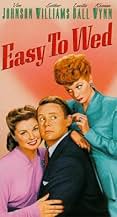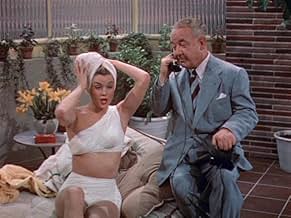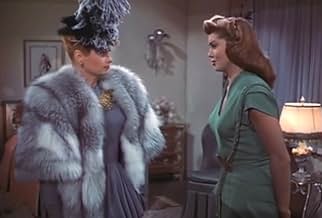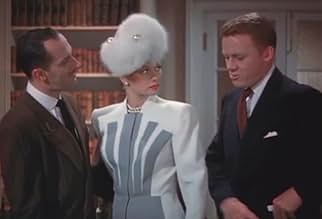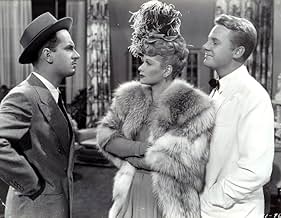IMDb-BEWERTUNG
6,1/10
989
IHRE BEWERTUNG
Füge eine Handlung in deiner Sprache hinzuTo prevent a libel case against the paper, a reporter tries to compromise the reputation of a tycoon's slandered daughter.To prevent a libel case against the paper, a reporter tries to compromise the reputation of a tycoon's slandered daughter.To prevent a libel case against the paper, a reporter tries to compromise the reputation of a tycoon's slandered daughter.
Carlos Ramírez
- Carlos Ramírez
- (as Carlos Ramirez)
William Bailey
- Newspaper Office Worker
- (Nicht genannt)
Empfohlene Bewertungen
"Libeled Lady" is one of the best comedies of the 1930s. Much of was the writing and much was due to the incredibly strong cast. Think about it---Spencer Tracy, Myrna Loy, Jean Harlow and William Powell--ALL in one film! In 1946, MGM brought out a remake. While the basic story is similar, it's not as good. Plus, Esther Williams, Van Johnson, Keenan Wynn and Lucille Ball just weren't as good--though they tried.
Like "Libeled Lady", the film is about a rich lady who is suing an irresponsible newspaper for its stories about her. However, oddly, in the original she was suing for $5,000,000 and here, a decade later, it's only $2,000,000--significant deflation, don't you think? To help try to get rid of the suit, the scheming newspaper man, Haggerty (Wynn), hires Bill Chandler (Van Johnson) to seduce the heiress, Connie Allenbury (Williams). Why? Because, in the interim, they'd get Bill a quickie marriage. Then, they'd have the 'jealous wife' storm in on them and threaten a suit of her own--along with photographers from the paper to make her case! But, since Bill isn't married, Haggerty has Chandler marry HIS fiancée (Lucille Ball)! Talk about romantic--getting Chandler to marry Haggerty's girl! There's only one problem with the plan...Bill falls for Connie and just can't get himself to do it. So, he schemes for a way to somehow please Haggerty AND Connie...if it's possible.
The film is decent and offers a few laughs. However it suffers from a few plot problems (Connie's falling in love with Bill seems incredibly fast considering how nasty she'd been towards him up until then), now includes song which got in the way of the plot and the characters aren't particularly likable (Connie is amazingly nasty--and for no reason--when she first meets Bill). Plus, it lacks the originality and fun of the first film. If you like remakes, by all means see this one. But, don't forget to first see "Libeled Lady"--it's just better.
By the way, the plot of "Easy to Wed" is very, very odd considering only about six months later, Keenan Wynn and his real-life wife divorced....so she could marry Van Johnson! To make it even weirder, it now appears that this, like the marriage in the movie, was a sham marriage, as in his later years Johnson admitted to being gay--and I sincerely doubt that this was a sudden late-life 'phase'!
Like "Libeled Lady", the film is about a rich lady who is suing an irresponsible newspaper for its stories about her. However, oddly, in the original she was suing for $5,000,000 and here, a decade later, it's only $2,000,000--significant deflation, don't you think? To help try to get rid of the suit, the scheming newspaper man, Haggerty (Wynn), hires Bill Chandler (Van Johnson) to seduce the heiress, Connie Allenbury (Williams). Why? Because, in the interim, they'd get Bill a quickie marriage. Then, they'd have the 'jealous wife' storm in on them and threaten a suit of her own--along with photographers from the paper to make her case! But, since Bill isn't married, Haggerty has Chandler marry HIS fiancée (Lucille Ball)! Talk about romantic--getting Chandler to marry Haggerty's girl! There's only one problem with the plan...Bill falls for Connie and just can't get himself to do it. So, he schemes for a way to somehow please Haggerty AND Connie...if it's possible.
The film is decent and offers a few laughs. However it suffers from a few plot problems (Connie's falling in love with Bill seems incredibly fast considering how nasty she'd been towards him up until then), now includes song which got in the way of the plot and the characters aren't particularly likable (Connie is amazingly nasty--and for no reason--when she first meets Bill). Plus, it lacks the originality and fun of the first film. If you like remakes, by all means see this one. But, don't forget to first see "Libeled Lady"--it's just better.
By the way, the plot of "Easy to Wed" is very, very odd considering only about six months later, Keenan Wynn and his real-life wife divorced....so she could marry Van Johnson! To make it even weirder, it now appears that this, like the marriage in the movie, was a sham marriage, as in his later years Johnson admitted to being gay--and I sincerely doubt that this was a sudden late-life 'phase'!
This film has its plusses -- Esthers swimming, her swimming, and her swimming. It's also in technicolor, which is always a treat to the eye. It really surprised me that a socco screenplay that made 1936's Libled Lady such a rip-roaring funny film could go so flat 10 years later. Of course Myrna Loy, Jean Harlow, William Powell, and Spencer Tracy were more highly skilled performers than this cast. Williams has some to the stoic, amused calm that Loy had and she does okay as Connie, but Lucille Ball is almost unfunny in this, which really surprised me. She lacks Harlows warmth and vulnerability and timing. Harlow really carried Libled Lady and one always looks forward to her scenes. Ball is too arch and steely here. It puts a damper on the films success.
Keenan Wynn's newspaper has been a political opponent of Cecil Kellaway for years. So when they publish an actionable story about his daughter, Esther Williams being a man-stealer, Kellaway wastes no time filing a lawsuit. The solution is to get womanizing Van Johnson to seduce her.... and to marry him to Wynn's fiancee, Lucille Ball, to make the first story retroactively true.
It's a remake of LIBELED LADY, with a few musical numbers and a swimming pool for Esther Williams to potsker around in. It's directed more as a straight farce than the original, and that part works all right; given that the original cast was Spencer Tracy, William Powell, Myrna Loy and Jean Harlow, it's hard for any of these to come up to snuff, although Miss Ball is very good. Johnson gives the impression of a small boy playing dress-up, and Keenan Wynn seems to think the movie is a lot funnier than it is.
It's a remake of LIBELED LADY, with a few musical numbers and a swimming pool for Esther Williams to potsker around in. It's directed more as a straight farce than the original, and that part works all right; given that the original cast was Spencer Tracy, William Powell, Myrna Loy and Jean Harlow, it's hard for any of these to come up to snuff, although Miss Ball is very good. Johnson gives the impression of a small boy playing dress-up, and Keenan Wynn seems to think the movie is a lot funnier than it is.
As the other comments here indicate, it's highly instructive to compare LIBELED LADY to this remake, EASY TO WED. A decade brought a huge difference in style between the Thalberg-approved slangy courtship of slapstick repartee and the plush, earnest romance of Louis B. Mayer's MGM of the '40s.
Lucille Ball steals this picture with a very well-judged comic performance, aided by director Edward Buzzell, who clearly throws many scenes her way. What will surprise those who know her primarily from "I Love Lucy" is to see how much of her comic shtick is already on view here, completely developed and intact. The drunk scene, the little voices, the 'takes,' stares, reactions and expressions are familiar in every way as Lucy Ricardo. Ball also never looked more beautiful than in this film, with her hair as metallic and bright as a new penny, and in a series of witty and gorgeous costumes by Irene, who does just as well by Esther Williams.
But those who are critical of Ball's performance, particularly in contrast to Jean Harlow's in LIBELED LADY, are right. Harlow was a natural, a wonderful, winning and unique personality, whose blustering scenes of anger were always justified, always expressing her common sense and dignity. The dirty little secret about why Lucille Ball never made it as a movie star was that despite her professionalism and beauty, she was essentially a strident and cold personality. What Harlow did naturally, Ball works very hard to achieve so that we admire her pyrotechnics without ever warming up to her. By the time of "I Love Lucy" she had begun to disguise her intensity with clutziness and feigned vulnerability and stupidity. And like Katharine Hepburn, she learned that if Lucy was reined-in by a man once in a while, audiences could forgive her for her aggressiveness.
There is relatively little of Esther Williams' swimming in this picture. At this mid-'40s point, MGM was pushing her versatility to see just how much she could do, how far she could go. I happen to think that her screen presence (even when out of the water) is underrated. She had a refreshing, no-nonsense self confidence that is very American, and she was sexy in a way that is never blatant. The fact that this statuesque beauty with her strong physical presence and perfect carriage never acts seductively or coyly creates an unexpected sexual tension, especially in her early films (she lost a bit of it later as her body became thicker and more athletic). You can see how some would feel moved to ruffle her composure, warm her up, 'get' to her in some way, because she seems oblivious to her femininity while brimming over with it. Which is what makes her seem an emblematic American movie star. In the first half of this picture she gives a good account of the kind of frigid glamor girl that Alexis Smith often played at Warners.' When she finally melts, it's lovely, though she is better photographed in both THRILL OF A ROMANCE and THIS TIME FOR KEEPS (where she rates closeups by Karl Freund that make her look almost impossibly, lustrously beautiful).
A word about MGM's '40s Technicolor -- I love it. Many films from this period as screened on TCM seem to have been saved, restored, remastered for video tapes and DVDs. All of Esther Williams' color films from the mid-'40s are a visual treat with bright, deeply saturated color and sharp images, though a few scenes in EASY TO WED seem unaccountably muddy and soft, with desaturated color. And in one scene Ball wears a frosty blue costume that we have been told is green. Maybe they should take a look at this print before they put this film out on DVD.
Lucille Ball steals this picture with a very well-judged comic performance, aided by director Edward Buzzell, who clearly throws many scenes her way. What will surprise those who know her primarily from "I Love Lucy" is to see how much of her comic shtick is already on view here, completely developed and intact. The drunk scene, the little voices, the 'takes,' stares, reactions and expressions are familiar in every way as Lucy Ricardo. Ball also never looked more beautiful than in this film, with her hair as metallic and bright as a new penny, and in a series of witty and gorgeous costumes by Irene, who does just as well by Esther Williams.
But those who are critical of Ball's performance, particularly in contrast to Jean Harlow's in LIBELED LADY, are right. Harlow was a natural, a wonderful, winning and unique personality, whose blustering scenes of anger were always justified, always expressing her common sense and dignity. The dirty little secret about why Lucille Ball never made it as a movie star was that despite her professionalism and beauty, she was essentially a strident and cold personality. What Harlow did naturally, Ball works very hard to achieve so that we admire her pyrotechnics without ever warming up to her. By the time of "I Love Lucy" she had begun to disguise her intensity with clutziness and feigned vulnerability and stupidity. And like Katharine Hepburn, she learned that if Lucy was reined-in by a man once in a while, audiences could forgive her for her aggressiveness.
There is relatively little of Esther Williams' swimming in this picture. At this mid-'40s point, MGM was pushing her versatility to see just how much she could do, how far she could go. I happen to think that her screen presence (even when out of the water) is underrated. She had a refreshing, no-nonsense self confidence that is very American, and she was sexy in a way that is never blatant. The fact that this statuesque beauty with her strong physical presence and perfect carriage never acts seductively or coyly creates an unexpected sexual tension, especially in her early films (she lost a bit of it later as her body became thicker and more athletic). You can see how some would feel moved to ruffle her composure, warm her up, 'get' to her in some way, because she seems oblivious to her femininity while brimming over with it. Which is what makes her seem an emblematic American movie star. In the first half of this picture she gives a good account of the kind of frigid glamor girl that Alexis Smith often played at Warners.' When she finally melts, it's lovely, though she is better photographed in both THRILL OF A ROMANCE and THIS TIME FOR KEEPS (where she rates closeups by Karl Freund that make her look almost impossibly, lustrously beautiful).
A word about MGM's '40s Technicolor -- I love it. Many films from this period as screened on TCM seem to have been saved, restored, remastered for video tapes and DVDs. All of Esther Williams' color films from the mid-'40s are a visual treat with bright, deeply saturated color and sharp images, though a few scenes in EASY TO WED seem unaccountably muddy and soft, with desaturated color. And in one scene Ball wears a frosty blue costume that we have been told is green. Maybe they should take a look at this print before they put this film out on DVD.
The "Morning Star" is desperately collecting their papers in fear of the powerful J. B. Allenbury. He promises to sue the paper for $2 million for defaming his daughter Connie Allenbury Chandler (Esther Williams). It's an open and shut case. The paper has been a thorn in the side of Allenbury and this is his chance to shut it down. Warren Haggerty (Keenan Wynn) leaves his wedding to performer Gladys Benton (Lucille Ball) to fix the problem. He has to rehire philandering reporter Bill Chandler (Van Johnson) to go on a mission to sully Connie's reputation. They come up with a scheme involving Gladys.
It gets a bit boring after the wedding. I've never seen Esther Williams as a particularly good actress. I hoped that reintroducing Lucille Ball would add some more screwball comedy. She does what she could but her role is somewhat limited. Van Johnson does the bulk of the comedic heavy lifting with mixed results. I like his solo duck hunting effort more so for its audacity. He is alone with the dog for a long time. As a trio, they are mostly bland like a 50's white toast sandwich with mayo. The movie picks up whenever Lucy gets to play. She's a fun drunk.
It gets a bit boring after the wedding. I've never seen Esther Williams as a particularly good actress. I hoped that reintroducing Lucille Ball would add some more screwball comedy. She does what she could but her role is somewhat limited. Van Johnson does the bulk of the comedic heavy lifting with mixed results. I like his solo duck hunting effort more so for its audacity. He is alone with the dog for a long time. As a trio, they are mostly bland like a 50's white toast sandwich with mayo. The movie picks up whenever Lucy gets to play. She's a fun drunk.
Wusstest du schon
- WissenswertesA remake of one of the great comedies of the 1930s - Lustige Sünder (1936) with Jean Harlow, William Powell, Myrna Loy, and Spencer Tracy.
- Zitate
William Stevens 'Bill' Chandler: You're too modest. Why, you're a woman of great depths, depths that have never been plumbed.
Gladys Benton: [referring to her boyfriend] No, Warren's not much of a plumber.
- VerbindungenFeatured in Lucy and Desi: A Home Movie (1993)
- SoundtracksContinental Polka
Lyrics by Ralph Blane
Music by Johnny Green
Sung and Danced by Lucille Ball (dubbed by Virginia Rees) and chorus
Top-Auswahl
Melde dich zum Bewerten an und greife auf die Watchlist für personalisierte Empfehlungen zu.
- How long is Easy to Wed?Powered by Alexa
Details
- Erscheinungsdatum
- Herkunftsland
- Sprache
- Auch bekannt als
- Que siga la boda
- Drehorte
- Produktionsfirma
- Weitere beteiligte Unternehmen bei IMDbPro anzeigen
Box Office
- Budget
- 1.683.000 $ (geschätzt)
- Laufzeit
- 1 Std. 50 Min.(110 min)
- Seitenverhältnis
- 1.37 : 1
Zu dieser Seite beitragen
Bearbeitung vorschlagen oder fehlenden Inhalt hinzufügen


